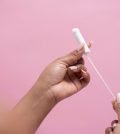- Listeria Danger Spurs Nationwide Recall of Frozen Waffles
- Washington Becomes 6th State to Report Bird Flu in Humans
- Seniors Who Split: Rates of ‘Gray Divorce’ Have Tripled Since 1990
- Black Patients 22% More Likely to Die After Bypass Surgeries
- Cataract Surgery Could Save Your Eyesight and Maybe Your Life
- Could Caffeine in Pregnancy Help Prevent Cerebral Palsy in Kids?
- Fatal Opioid-Meth Overdoses Have Fallen in U.S. by More Than a Third
- At-Home Brain Stimulation Treatment Can Safely Ease Depression
- Even Hardcore Smokers May Quit If Given Right Tools, Study Finds
- Light Therapy Might Help Ease ‘Dry’ Form of Macular Degeneration
Health Highlights: Jan. 17, 2014


Here are some of the latest health and medical news developments, compiled by the editors of HealthDay:
‘Smart’ Contact Lenses Would Measure Sugar Levels in Diabetics
Google is working on smart contact lenses that would measure sugar (glucose) levels in the tears of people with diabetes.
If successful, the contacts would offer diabetics a painless and more convenient alternative to having to prick themselves to get blood to put onto test strips that are placed in an electronic reader.
The prototype contact lenses have miniscule wireless chips and glucose sensors and are able to measure sugar levels once per second. LED lights inside the lenses would flash when sugar levels are too low or high, CNN reported.
Google has conducted clinical research studies on the contact lenses and is in discussions with the U.S. Food and Drug Administration.
This isn’t the first attempt to develop such a device. In 2011, Microsoft teamed with the University of Washington to create contact lenses with glucose sensors and small radios, CNN reported.
—–
Judge Rejects Legal Challenge Against Health Insurance Subsidies
A legal challenge against health care insurance subsidies for millions of Americans was rejected Wednesday by a federal judge.
The subsidies are a key part of the Affordable Care Act and are available to low- and middle-income people regardless of whether they purchase health coverage through the federal insurance exchange or in state-run marketplaces, The New York Times reported.
People who may qualify for subsidies include those with annual incomes up to $45,960 for individuals and up to $94,200 for a family of four.
Opponents of the health care law filed a lawsuit claiming that a literal reading of the act would permit subsidies only in the 14 states with their own insurance exchanges. The legal action was launched by several people in states that use the federal exchange: Tennessee, Texas, Virginia and West Virginia.
But Judge Paul Friedman of the U.S. District Court in Washington, D.C. said the claim made in the lawsuit was absurd and contrary to the whole purpose of the health care law, The Times reported.
“The plain text of the statute, the statutory structure and the statutory purpose make clear that Congress intended to make premium tax credits available on both state-run and federally facilitated exchanges,” Friedman said.
He added: “Congress assumed that tax credits would be available nationwide” and “on any exchange, regardless of whether it is operated by a state” or by the federal government.
The ruling is “an important win for health care consumers across the country,” Ronald Pollack, executive director of Families U.S.A., told The Times.
The plaintiffs will appeal the decision, according to Sam Kazman, general counsel of the Competitive Enterprise Institute, which is coordinating and helping finance the lawsuit.
Similar lawsuits against subsidies in the federal exchange have been filed by several Virginia residents and by state officials in Oklahoma and Indiana, The Times reported.
The exchanges opened Oct. 1 and nearly 1.2 million people had chosen plans in the federal marketplace and nearly a million had selected plans in state exchanges as of Dec. 28.
About 80 percent of people who selected plans from federal or state exchanges qualified for subsidies to lower their premiums, The Times reported.
Copyright © 2024 HealthDay. All rights reserved.










